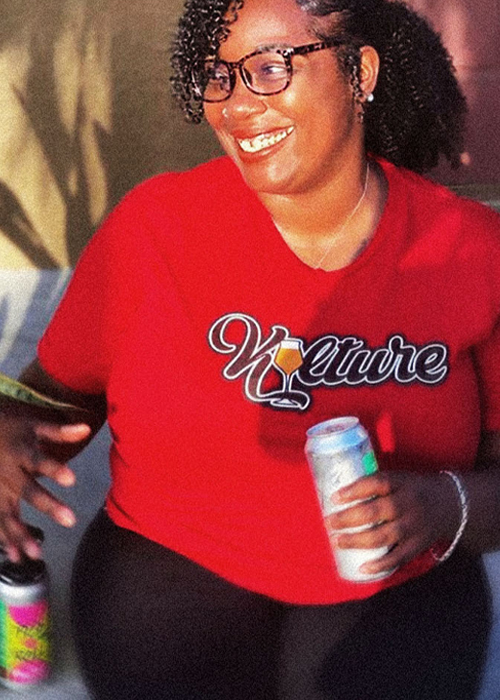Last week, nonprofit community organization Beer Kulture announced its latest initiative to help support the Black community: the Sparks Foundation. The program pinpoints a specific need within and beyond the beer industry: access to career opportunities for Black men and boys. The foundation is named for Darren “Sparks” Massenburg, a former family friend of Beer Kulture CEO and co-founder Latiesha Cook.
In a Twitter thread on Wednesday, Cook shared screenshots of a paywalled report on the foundation published in Brewbound. “I wanted to share this article for those who may not have access because it’s important for those who yearn for understanding to have insight,” she writes. She explains that Black men and boys don’t have access to traditional paths to entrepreneurship — from education and job opportunities to grants and bank loans — because they are turned away at these points in their lives. The Sparks Foundation will award four $5,000 grants per year, funded by Beer Kulture “kollaboration” partners (though the grants are not limited to beer-industry jobs). The first, funded by Primitive Beer Co. of Longmont, Colo., will be awarded in August.

Beer Kulture’s efforts are certainly exceptional. As Cook says, “Many don’t understand the need behind the creation of a program that specifically benefits Black men and boys.” But even if the Sparks Foundation stands out for this reason, beer drinkers and industry members should take note: It joins a list of programs with a similar trajectory for Black, Indigenous, people of color (BIPOC), and minority groups in the beer community.
Brooklyn Brewery brewmaster Garrett Oliver spearheaded the Michael James Jackson Foundation for Brewing & Distilling last year; launched in July 2020, it provides scholarships to up-and-coming BIPOC brewers and distillers in the U.S.
Fawn Weaver, founder and CEO of Uncle Nearest Premium Whiskey, recently unveiled the Uncle Nearest Venture Fund; launched in June, it will provide $50 million to minority-owned businesses, beginning with Jack from Brooklyn, and Equiano Rum.
Along with those making headlines in national news, there’s a lot more happening behind the scenes: Individuals like Eugenia Brown, alias Black Beer Chick, whose Road to 100 is helping that many BIPOC women achieve Cicerone certification; Dr. J Jackson-Beckham is making moves in the craft brewing space through her roles as principal of Crafted for All, equity and inclusion partner of the Brewers Association, and founder and executive director of Craft x EDU, the latter of which focuses on brewing education and professional development.
Whether it’s $5,000 or $50 million, this is what true advocacy looks like. And it only takes a little digging to see what allyship looks like, too — and to look within ourselves to see what we can contribute. It is something I am working on personally and professionally in my own work, for my company and for the craft beer community. Or, as Cook says, “for the kulture.”
AB InBev CEO Departs, Ushers in Status Quo
Last week, Anheuser-Busch InBev’s former CEO Carlos Brito concluded his 15-year tenure leading the organization. Michel Doukeris has taken his place as AB InBev CEO. In a letter to investors and analysts, Brito offered the usual boilerplate language, commending his colleagues for their efforts, as well as AB InBev’s strides in sustainability, diversity and inclusion, Brewbound reports. Meanwhile, Doukeris plans to maintain the status quo.
Succeeding Doukeris as zone president for North America and as CEO of A-B’s U.S. operations is Brendan Whitworth.
C-suite execs come and go, and it’s certainly no easy entry to lead the biggest beer brand in the world. But I see a missed opportunity here: With the aforementioned DEI efforts, these were two chances to appoint other equally competent executives who perhaps have a different background, like, oh, I don’t know, female. With the exception of AB InBev’s lawyer (shout out to general counsel Katherine Barrett), not one of the company’s leadership team is non-male. Indeed, every one of the 11 chief executives and six zone presidents are men.
AB InBev may have more work to do when it comes to diversifying its leadership team, but clearly it doesn’t matter enough. As Doukeris said in a press release, they’ll do “what is already working.”

Beer NFTs Are Officially, Sort of Becoming a Thing
Blockchain-loving beer lovers can finally bid on an NFT. The goods? A fried chicken recipe.
Although the NFT is technically for ownership of chef Marcus Samuelsson’s recipe and has less to do with Stella Artois, AB InBev’s announcement follows smaller-scale attempts by brewers to get in on the non-fungible action. In June, Denver Beer Co. put a lifetime supply of beer up for auction via its “Beer for Life” NFT. Bids reached close to $2,000 as of this writing.
Although it wasn’t auctioned, Greenpoint Beer & Ale’s tongue-in-cheek Crypto Future Double IPA made reference to NFTs on its label.
And in Victoria, British Columbia, Whistle Buoy Brewing Co. announced the limited-edition launch of its NFT IPA, a 32-ounce gold-can-encased hazy IPA hopped with Nelson, Flex, and Trident hops. (See what they did there?) Along with the 250 beers, a piece of digital artwork is up for auction “on the blockchain,” as they say, depicting a digital animation of the golden can in a spacescape.
While I’m doubtful that the artist, Ryan Steele, will see much cash flow from his animation, I do see some potential in using NFTs to help create buzz around local artists and brewery fundraisers. Who knows? This may even be an actual reason for small breweries to launch a new hazy double IPA every other day.
This story is a part of VP Pro, our free platform and newsletter for drinks industry professionals, covering wine, beer, liquor, and beyond. Sign up for VP Pro now!
